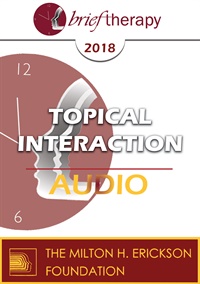
- Average Rating:
- Not yet rated
- Topic Areas:
- Topical Interactions | Brief Therapy | Psychotherapy | Hypnosis
- Categories:
- Brief Therapy Conference | Brief Therapy Conference 2018
- Faculty:
- Michael Yapko, PhD
- Duration:
- 1:00:04
- Format:
- Audio Only
- Original Program Date:
- Dec 08, 2018
- Short Description:
- This session explores the role of hypnosis in brief psychotherapy, highlighting its therapeutic potential beyond myths and misconceptions. Drawing on neuroscience and clinical practice, the discussion shows how hypnosis redirects attention, mobilizes hidden resources, and enhances the effectiveness of other approaches. Participants gain a deeper understanding of how experiential absorption can facilitate change in pain relief, emotional regulation, and resilience.
- Price:
- $15.00 - Base Price
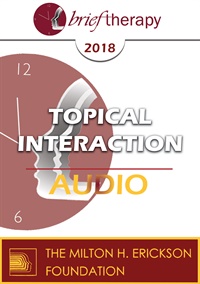
- Average Rating:
- Not yet rated
- Topic Areas:
- Topical Interactions | Couples Therapy | Love | Solution Oriented Approach | Brief Therapy
- Categories:
- Brief Therapy Conference | Brief Therapy Conference 2018
- Faculty:
- Elliott Connie, MA, LPC
- Duration:
- 58:58
- Format:
- Audio Only
- Original Program Date:
- Dec 08, 2018
- Short Description:
- Since the Solution Focused Approach is conversational in nature, and, based on questions, the clinician who is working with couples needs to be comfortable asking these kinds of questions when there are more than one person in the room. This can be tricky due to the nature of couples therapy. This talk will center on how to conduct couples session using this approach and how to use the question process to navigate even the trickiest sessions.
- Price:
- $15.00 - Base Price
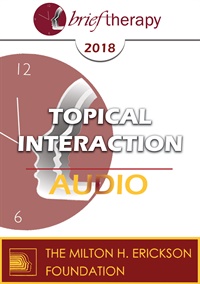
- Average Rating:
- Not yet rated
- Topic Areas:
- Topical Interactions | Anxiety | Brief Therapy | Children and Adolescent Therapy | Community | Depression
- Categories:
- Brief Therapy Conference | Brief Therapy Conference 2018
- Faculty:
- Lynn Lyons, LICSW
- Duration:
- 1:03:32
- Format:
- Audio Only
- Original Program Date:
- Dec 08, 2018
- Short Description:
- Educators are being asked to do more and more to support the emotional wellbeing of students and understand the mental health needs of their students. Programs are consistently being introduced and professional development offered. What's working and what isn't? How much can we expect of teachers and administrators? How is the collaboration and communication between parents, schools, and outside providers going? And what are students actually earning in about their mental health in school?
- Price:
- $15.00 - Base Price
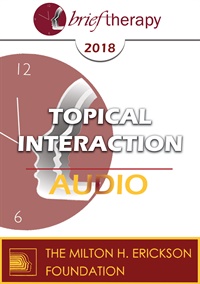
- Average Rating:
- Not yet rated
- Topic Areas:
- Topical Interactions | Brief Therapy | Communication | Evocative Communication | Resources
- Categories:
- Brief Therapy Conference | Brief Therapy Conference 2018
- Faculty:
- Bill O'Hanlon, MS
- Duration:
- 53:03
- Format:
- Audio Only
- Original Program Date:
- Dec 08, 2018
- Short Description:
- What can brief therapy work? In this session, Bill O'Hanlon will make the case that it involves evocation of already existing resources, so the client doesn't have to be fixed, taught new skills or make major changed to resolve problems.
- Price:
- $15.00 - Base Price
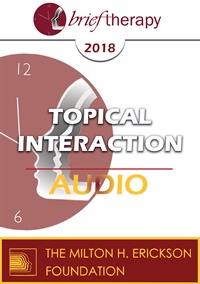
- Average Rating:
- Not yet rated
- Topic Areas:
- Topical Interactions | Anorexia | Eating Disorders | Bulimia | Brief Therapy
- Categories:
- Brief Therapy Conference | Brief Therapy Conference 2018
- Faculty:
- Camillo Loriedo, MD, PhD
- Duration:
- 1:00:27
- Format:
- Audio Only
- Original Program Date:
- Dec 08, 2018
- Short Description:
- Various attempts to treat these disturbances briefly have been made, but in most cases they proved to be unsuccessful due a very high relapse rate. To avoid a fearsome chronicity, a number of other factors, like alexithymia, low self-esteem, perfectionism, dissociation, dichotomous thinking, and others should be considered for treatment. Indications of how to deal with these factors in Ericksonian Brief Therapy will be offered.
- Price:
- $15.00 - Base Price
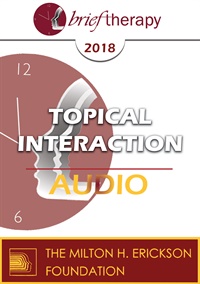
- Average Rating:
- Not yet rated
- Topic Areas:
- Topical Interactions | Psychotherapy | Brief Therapy | Therapeutic Relationship | Therapist Development
- Categories:
- Brief Therapy Conference | Brief Therapy Conference 2018
- Faculty:
- Stephen Gilligan, PhD
- Duration:
- 1:04:33
- Format:
- Audio Only
- Original Program Date:
- Dec 08, 2018
- Short Description:
- Every meaningful therapy conversation includes a significant presence of difficult emotions--symptoms, responses, anger, fear, etc. We will have a conversation about how to skillfully welcome and utilize such negative experiences as integral parts of a successful, creative therapy.
- Price:
- $15.00 - Base Price
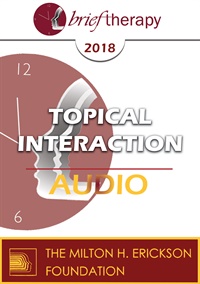
- Average Rating:
- Not yet rated
- Topic Areas:
- Topical Interactions | Feedback Informed Treatment (FIT) | Tailoring | Relationships | Therapeutic Relationship | Therapist Development
- Categories:
- Brief Therapy Conference | Brief Therapy Conference 2018
- Faculty:
- Scott Miller, PhD
- Duration:
- 57:17
- Format:
- Audio Only
- Original Program Date:
- Dec 08, 2018
- Short Description:
- Available evidence indicates that the effectiveness of psychotherapy has not improved despite 100 years of theorizing and research. What would help? Not learning a new model of therapy or the “latest” so-called “evidence-based” treatment approach. A simple, valid, and reliable alternative exists for maximizing the effectiveness and efficiency of treatment based on using ongoing feedback to empirically tailor services to the individual client needs and characteristics. Research from multiple randomized clinical trials documents that this simple, transtheoretical approach as much as doubles the effectiveness of treatment while simultaneously reducing costs, drop-out rates and deterioration. At this "Topical Interaction," participants will have a chance to address any practical issues, questions or challenges associated with incorporating outcome and alliance measures into their practice.
- Price:
- $15.00 - Base Price
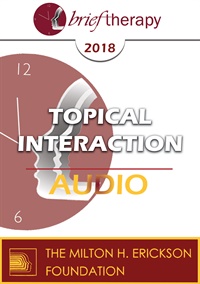
- Average Rating:
- Not yet rated
- Topic Areas:
- Topical Interactions | Depression
- Categories:
- Brief Therapy Conference | Brief Therapy Conference 2018 | Pioneers in Couples and Family Therapy
- Faculty:
- Michele Weiner-Davis, LCSW
- Duration:
- 1:00:11
- Format:
- Audio Only
- Original Program Date:
- Dec 08, 2018
- Short Description:
- This presentation offers a candid exploration of personal experience with depression and its clinical implications. Drawing from her own journey, Weiner-Davis highlights the healing role of daily structure, supportive relationships, and meaning-making. The talk underscores the value of therapist self-disclosure, normalizing client experiences, and integrating empathy with clinical skill to foster connection and hope in treatment.
- Price:
- $15.00 - Base Price
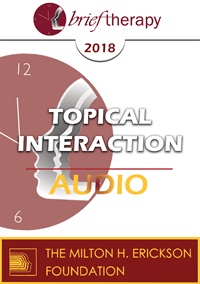
- Average Rating:
- Not yet rated
- Topic Areas:
- Topical Interactions | Psychotherapy | Femininity | Supervision
- Categories:
- Brief Therapy Conference | Brief Therapy Conference 2018
- Faculty:
- Laura Brown, PhD
- Duration:
- 57:06
- Format:
- Audio Only
- Original Program Date:
- Dec 08, 2018
- Short Description:
- There is a dynamic tension between the necessarily hierarchical structure of psychotherapy supervision and the liberatory/egalitarian models of feminist and other liberatory practices. This will be a chance for psychotherapy supervisors who are struggling with this dilemma to discuss this topic with the author of the feminist model of psychotherapy supervision
- Price:
- $15.00 - Base Price
Tags: Feminine Psychotherapy Supervision
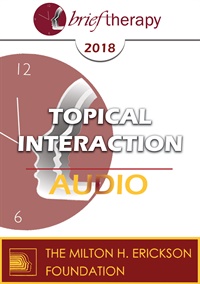
- Average Rating:
- Not yet rated
- Topic Areas:
- Topical Interactions | Attachment
- Categories:
- Brief Therapy Conference | Brief Therapy Conference 2018 | Pioneers in Couples and Family Therapy
- Faculty:
- Stan Tatkin, PsyD, MFT
- Duration:
- 1:10:38
- Format:
- Audio Only
- Original Program Date:
- Dec 08, 2018
- Short Description:
- Working with various attachment organizations requires a deep understanding of both attachment theory and sensitivity to the fears and apprehensions of insecures on both distancing and clinging sides of the spectrum. We will discuss the benefits of using crossing techniques in couple therapy to minimize defensive reactions and to increase intervention effectiveness. Also, we hope to cover the matter of unresolved trauma and loss in the emergence of disorganization during therapy.
- Price:
- $15.00 - Base Price
Tags: Therapist Development
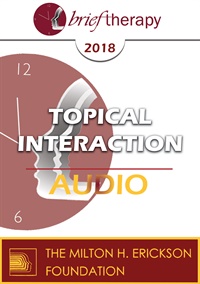
- Average Rating:
- Not yet rated
- Topic Areas:
- Topical Interactions | Brief Therapy | Milton Erickson
- Categories:
- Brief Therapy Conference | Brief Therapy Conference 2018
- Faculty:
- Jeffrey Zeig, PhD
- Duration:
- 57:25
- Format:
- Audio Only
- Original Program Date:
- Dec 08, 2018
- Short Description:
- Describe and exemplify essentials of Milton Erickson's approach to Brief Therapy.
- Price:
- $15.00 - Base Price
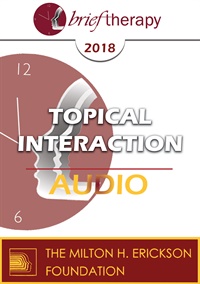
- Average Rating:
- Not yet rated
- Topic Areas:
- Topical Interactions | Belief Systems | Brief Therapy | Therapist Development
- Categories:
- Brief Therapy Conference | Brief Therapy Conference 2018
- Faculty:
- Robert Dilts, BA
- Duration:
- 1:00:27
- Format:
- Audio Only
- Original Program Date:
- Dec 08, 2018
- Short Description:
- Our beliefs are a very powerful force upon our behavior. It is common knowledge that if someone really believes he can do something he will do it, and if he believes something is impossible no amount of effort will convince him that it can be accomplished. Times of change and crisis bring out the significance of our beliefs even more strongly. The beliefs and stories (mental models and assumptions) that we and others hold during an unstable or crucial time determine the degree of resourcefulness with which we will face the situation. Empowering beliefs help us to identify and take best advantage of potential opportunities, while limiting beliefs focus us on danger and can trap us into old survival strategies (i.e., attack, retreat, freeze, etc.). This interaction will explore how to identify and work with the belief issues that arise during brief therapy.
- Price:
- $15.00 - Base Price

